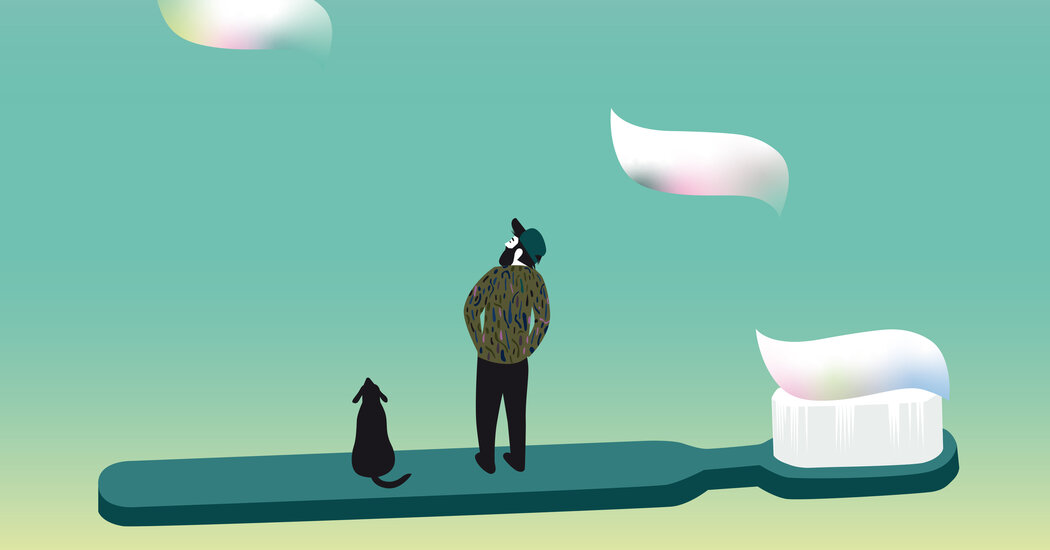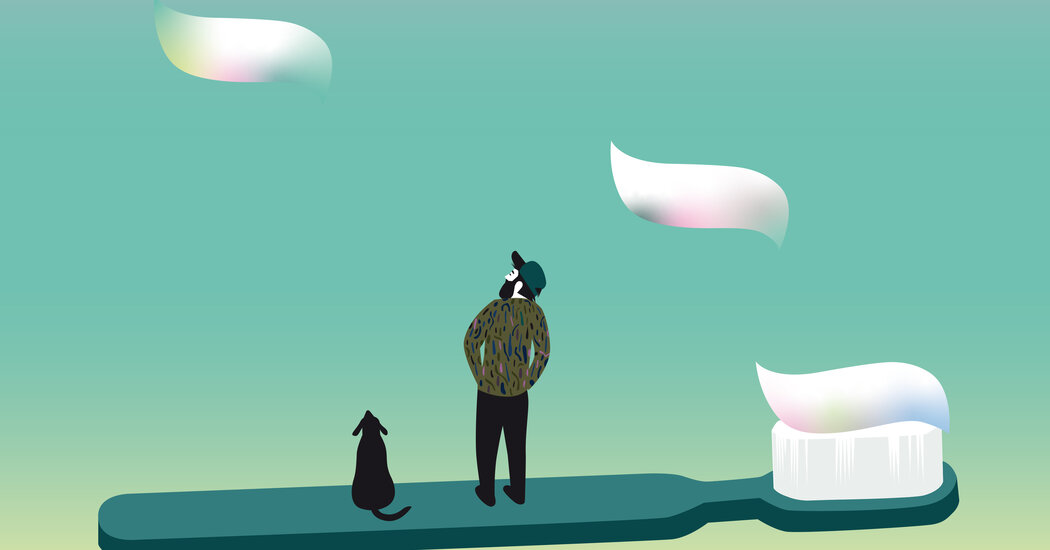La pandemia me enseñó a valorar la rutina
Las rutinas y rituales siempre me protegieron del caos. Cuando llegó la pandemia y todo se trastocó, me propuse reactivarlas.Este artículo forma parte de una serie sobre la resiliencia en tiempos difíciles: lo que podemos aprender de las historias y las experiencias personales.Me despidieron en diciembre. No puedo decir que no lo esperaba. Todo se estaba desmoronando en todas partes, incluido el mundo de los medios de comunicación, pero cuando ocurrió, lo primero que me preocupó —antes que las dudas sobre cómo ganaría dinero o qué haría con el seguro— fue si me quedaría sin la rutina que había desarrollado, perdido y que luego me costó tanto trabajo recuperar.Todos teníamos nuestras rutinas antes de la pandemia y muchas de ellas se vieron alteradas. Casi todas las rutinas personales, si no se interrumpieron por completo, cambiaron de alguna manera, de lo mundano a lo esencial. El hombre mayor que solía ver saboreando lentamente un café expreso todos los días en la cafetería tuvo que pedirlo en un vaso para llevar y beberlo afuera. Hasta que llegó el confinamiento, un amigo iba al centro a ver a sus padres todos los domingos por la mañana, pero tuvo que dejar de hacerlo. Los niños dejaron de asistir a la escuela y gran parte de los trabajadores dejaron de acudir a las oficinas. Tratar de mantener una rutina ya era bastante difícil cuando parecía que el mundo se iba a desmoronar; tratar de establecer rutinas nuevas sin ninguna indicación clara de lo que deparaba el futuro parecía francamente imposible.La vida es una serie de rutinas. Nos acostamos, nos levantamos, trabajamos, jugamos, pero para algunos, las rutinas y los rituales nos ayudan a funcionar contra el caos del mundo y, en muchos casos, de nuestra mente. Algunas mentes no están hechas para las rutinas; por eso he tenido que esforzarme más y disciplinarme para vivir y trabajar de una manera determinada.De niño crecí en una incertidumbre constante, gracias a una vida familiar inestable, a unos padres que se mudaban frecuentemente y, a partir de los 16 años, a no tener un hogar propio. El trauma de esas experiencias empezó a apoderarse de mí, me desgastó y se mezcló con mis diagnósticos de trastorno por déficit de atención e hiperactividad, depresión y trastorno obsesivo-compulsivo de la personalidad, lo que hacía casi imposible que pudiera concentrarme, trabajar y, en general, ser productivo y feliz a diario.En algún momento, por casualidad, empecé a darme cuenta de que cuanto más ponía límites y horarios —levantarme, comer y meditar a horas específicas, hacer ejercicio y anotar el programa del día siguiente—, no solo aumentaba mi sensación de control, sino también de felicidad. Al establecer rutinas para mí, pude protegerme del caos.“Te ayuda a sentir que tienes el control”, dijo en una entrevista Charles Duhigg, autor de El poder del hábito. “Te ayuda a recordar cómo hacer cosas que —quizá por tu trastorno por déficit de atención e hiperactividad— olvidarías debido a la memoria a corto plazo”. En su libro, Duhigg explora la especie de ouróboro —el antiguo símbolo de una serpiente que se come su propia cola— que estaba realizando conmigo mismo. Necesitaba algún tipo de señal, una rutina y luego una recompensa. No había pensado en las recompensas como parte del proceso, pero son esenciales.Pensaba que la recompensa para mí era la tranquilidad. Lo que no sabía es que también me daba otros pequeños trofeos: si iba al gimnasio cinco días a la semana, había una vocecita en mi cabeza que decía: “Te has ganado dos porciones de pizza”. Cuando limpiaba la casa el domingo por la mañana, siempre me abría una cerveza por la tarde. Y a veces ni siquiera eres consciente de las recompensas que te das a ti mismo por la rutina, y creo que esas son las más importantes. Con esas recompensas, estoy siendo bueno conmigo mismo, diciéndome que he hecho algo, así que me he ganado algo.“Te obligas a anticipar las recompensas”, dice Duhigg. “Todo eso es muy bueno”.Para Esmé Weijun Wang, autora de la colección de ensayos The Collected Schizophrenias, “las rutinas y los rituales son una parte fundamental para mantener mi salud mental”, me dijo. Las rutinas de Wang incluyen “mi agenda analógica, en la que escribo un diario, gestiono mis citas y apunto las tareas, que, junto con una serie de otros cuadernos y carpetas, organizan las cosas de manera que la vida se sienta menos abrumadora”.Igualmente importante —y quizá más difícil— es mantener las rutinas. Así que, aunque anotar las citas es importante, recordarme a mí mismo que debo levantarme a una hora determinada, meditar, mi trabajo de la 1 p.m. y mi pausa para llamar por teléfono son actos que me recuerdan dónde van a estar las aguas tranquilas en lo que podría resultar ser un mar agitado.“Cuando cambias un hábito en tu vida que antes considerabas importante”, dijo Duhigg, “solo tienes que ser consciente de cómo cambias ese hábito deliberadamente”.No obstante, en ocasiones las fuerzas externas desbordan la capacidad de mantenerse. Tras cinco años de rutinas constantes, llegó la pandemia. El primer día que trabajé desde casa, mi rutina se vino abajo. Nos dijeron que sería durante una semana, luego dos, después el mes que viene, luego a finales del verano y luego quizás después del Día de Acción de Gracias. Tarde o temprano, volveríamos a la oficina, probablemente. Empecé a dormir hasta más tarde; cuando el gimnasio cerró, tuve que buscar una nueva manera de hacer ejercicio, y como cada cosita que había considerado parte de un día normal para mí empezó a desaparecer, no me di cuenta de cuán deprimido estaba.Para cuando empecé a salir de mi depresión y a darme cuenta de que iba a tener que aprender a adaptarme, ya era otoño. Todavía no había una oficina o un gimnasio o un lugar al que pudiera ir para ver a la gente en persona y conversar con ella con medidas de seguridad. Evité a mi terapeuta durante meses porque me sentía incómodo tomando las sesiones por Zoom. De vez en cuando me saltaba la meditación matutina. Abría y me comía una bolsa de papas fritas en pocos minutos. Era el tipo de espiral que creía haber descubierto cómo corregir.Entonces, una mañana, saqué uno de mis diarios viejos para ver qué había hecho bien en el pasado. Tenía notas sobre lo que funcionaba en mi rutina y lo que no, sobre cómo beber café a ciertas horas me hacía sentir más ansioso o sobre cómo consultar Twitter antes de las 8 de la mañana casi siempre me ponía de mal humor. Me había dejado pequeños recordatorios por si me perdía en el camino.Un día, salí a pasear a mi perro y decidí, sin motivo alguno, que la banda sonora de esa mañana sería Ambient 1/Music for Airports de Brian Eno, un álbum que el compositor escribió y grabó para ayudar a calmar a los viajeros ansiosos. Decidí que caminaría durante toda la primera pista —17 minutos y 22 segundos— antes de volver a casa. Estaba haciendo algo que hacía todas las mañanas, pero al dar vuelta en una esquina, me di cuenta de que también me estaba preparando para el día y sentí una comodidad que no había sentido en meses. Los bucles musicales de Eno sin letras y con ritmos de piano simplemente sirvieron como ruido de fondo para mi meditación a pie no planificada y como recordatorio de cuán necesaria era.Fue entonces cuando empecé a restablecer mi rutina. Al cabo de una semana, volví a tener una especie de horario normal para levantarme, sacar al perro a pasear y permitirme revisar Instagram. Estaba llegando a un punto tan cómodo como es posible estar durante una pandemia. Entonces, recibí el mensaje a través de Slack de que me necesitaban para una reunión con una persona de Recursos Humanos. Sabía lo que iba a ocurrir a continuación.Evidentemente, estaba sintiendo todo eso que uno siente cuando pierde un trabajo. Era doloroso. Mis finanzas iban a sufrir un golpe. El único canal de comunicación que tenía con alguien, además de mi esposa, se había cortado, pero me di cuenta de que no podía hacer nada más que levantarme y empezar a preparar mi agenda para el día siguiente. El día de mañana, y todos los días posteriores, mi rutina y mis rituales estaban solo en mis manos. Y eso no me lo podía quitar nadie.El libro más reciente de Jason Diamond es The Sprawl.
Read more →

